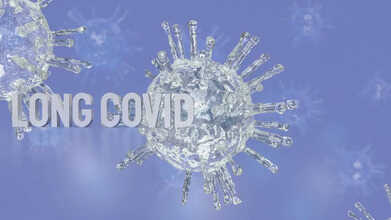- Health Conditions A-Z
- Health & Wellness
- Nutrition
- Fitness
- Health News
- Ayurveda
- Videos
- Medicine A-Z
- Parenting
- Web Stories
Working For More Than 52 Hours Could Alter Your Brain Structure

Credits: Canva
A new study published in the Journal of Occupational and Environment Medicine has found evidence that working excessively long hours could in fact alter the physical structure of the brain. The research was conducted by scientists from Chung-Ang University and Yonsei University in South Korea. The research offers a rare glimpse into how chronic overwork may affect not just one's mental wellbeing, but also alter the brain anatomy,
What Does The Study Say?
In South Korea, the legal maximum weekly working hours is 52. However, overwork there has become a pressing public health issue. The study thus tracked 110 healthcare workers, and divided them into two groups: "overworked" - individuals who worked for 52 hours or more and "non-overworked" - individuals who worked for standard hours.
The study also used a neuroimaging technique and MRI scans, where researchers were able to examine differences in gray matter between the two groups.
"People who worked 52 or more hours a week displayed significant changes in brain regions associated with executive function and emotional regulation, unlike participants who worked standard hours," the researchers said in a press release.
What Are The Changes Noted In Brain?
The analysis also revealed that overworked individuals had notable increases in the volume of them idle frontal gyrus. This part plays a role in attention, memory and cognitive control.
There were also changes observed in the insula, which is responsible for emotional processing, self-awareness and understanding social context.
These changes point a biological basis for the cognitive fog, mood shifts, and emotional fatigue that is commonly reported in people who work for excessively long hours. Coauthor Joon Yul Choi from Yonsei University told CNN that these brain changes "might be at least in part, reversible" if environmental stressors like overwork are reduced—though he cautioned that a full return to baseline brain function could take time.
Why Does It Matter?
This research builds upon previous findings. A 2021 joint study by the World Health Organization (WHO) and the International Labour Organization (ILO) estimated that long working hours led to over 745,000 deaths annually, making overwork a leading occupational risk factor.
Frank Pega, who led the WHO-ILO study, told CNN that this new research provides “important new evidence” of how long working hours “radically” impact physical health. He stressed that governments, employers, and workers need to act collectively, citing laws and policies that can protect against health risks associated with overwork.
While the study’s small sample size and exclusive focus on Korean healthcare workers limit its generalizability, experts believe it opens the door to deeper exploration. Jonny Gifford, principal research fellow at the Institute for Employment Studies in the UK, told CNN that the findings "confirm some physiological reasons that working long hours affects our wellbeing."
He emphasized that although the study is preliminary, its use of neurological imaging lends "powerful new evidence linking overwork with structural changes in parts of the brain involved in executive function and emotional regulation."
In the words of the study’s authors, “The results underscore the importance of addressing overwork as an occupational health concern.”
World Arthritis Day 2025: Date, Theme, Significance And History Explained

Credits: Canva
Every year, people across the world unite on World Arthritis Day to spread awareness about arthritis and related disorders. Observed annually on October 12, the day aims to draw attention to the everyday challenges faced by those living with arthritis, encourage early diagnosis, and promote better medical care and support systems.
As World Arthritis Day 2025 approaches, it’s a timely reminder to learn about its theme, importance, and the role each of us can play in improving the lives of those affected.
Why World Arthritis Day Matters
Arthritis is often mistaken for a simple case of joint pain, but it is far more complex. It includes a wide range of conditions that can impact a person’s mobility, independence, and overall well-being. One of the main goals of World Arthritis Day is to break these misconceptions, spread accurate information, and raise awareness that arthritis can affect anyone, regardless of age.
Raising awareness also encourages timely medical consultation, physiotherapy, and healthier lifestyle choices that can help manage symptoms and prevent complications.
World Arthritis Day 2025 Theme
The theme for World Arthritis Day 2025 is “Realizing Your Dreams” or “The Courage to Dream.” This year’s message highlights the importance of personal aspirations and resilience among people living with rheumatic and musculoskeletal diseases (RMDs). It inspires individuals to pursue their dreams while encouraging collaboration between patients, doctors, and advocates to turn those dreams into reality.
The theme serves as a reminder that arthritis is not just a physical condition, it is about preserving one’s independence, dignity, and quality of life.
When Is World Arthritis Day Celebrated?
World Arthritis Day is marked every year on October 12 around the globe. In India too, this day is recognised and observed to underline the importance of awareness and education about arthritis. With lifestyle changes and rising stress levels, arthritis is now being diagnosed in younger people as well, making awareness even more vital.
Ways to Raise Awareness on World Arthritis Day 2025
Spreading awareness is not limited to medical professionals or organizations. Every individual can help in small but meaningful ways. Some simple ideas include:
- Educational Programs: Schools, offices, and community groups can organize sessions to teach people about arthritis symptoms and preventive care.
- Social Media Campaigns: Sharing real-life stories, verified facts, and official theme posters can reach thousands online.
- Community Events: Walkathons or charity runs can raise both funds and awareness.
- Free Health Camps: Clinics and hospitals can offer free joint check-ups to encourage early diagnosis.
These collective efforts ensure that arthritis is not ignored or misunderstood, but openly discussed and addressed.
Tips for Living with Arthritis
Awareness is the first step, but supporting those who live with arthritis every day is just as important. Here are some ways to help manage the condition and maintain a good quality of life:
Stay Active, but with Care
Choose gentle exercises such as walking, yoga, or swimming to keep joints flexible and reduce stiffness without straining them.
Eat a Balanced Diet
Include anti-inflammatory foods such as leafy greens, fatty fish rich in omega-3, nuts, and olive oil to help ease inflammation.
Get Enough Rest
Quality sleep helps the body recover. Avoid overexertion but stay active enough to prevent stiffness.
Use Supportive Tools if Needed
Walking sticks, braces, or other assistive devices can reduce stress on joints and make movement easier.
Maintain a Positive Outlook
Joining arthritis support groups or connecting with others who share similar experiences can provide motivation and emotional support.
For those seeking specialized treatment, visiting a reputed multispeciality hospital in Coimbatore can help patients receive comprehensive arthritis care, from diagnosis to therapy and rehabilitation, under one roof.
Is Donald Trump Showing Early Phonemic Paraphasia? Here’s Why Health Experts Think So

As Donald Trump recently went for his second health checkup, the visit, announced earlier this week by the White House comes as he prepares to travel to the Middle East following a ceasefire deal in the Israel-Hamas war. White House press secretary Karoline Leavitt called it a “routine yearly checkup,” even though the president had already undergone his annual physical in April. According to a memo obtained by CBS News on Friday evening, written by Trump’s physician, Capt. Sean Barbabella, the president “successfully completed a scheduled follow-up evaluation.”
The president also received his annual flu vaccination and an updated COVID-19 booster. Interestingly, his cardiac age, a validated measure of cardiovascular health via ECG was found to be roughly 14 years younger than his chronological age. However, health experts remain concerned, with many noting potential signs of dementia. Now, some specialists are also pointing to early indicators of phonemic paraphasia in his speech.
What Is Phonemic Paraphasia That Health Experts Believe Donald Trump Has Signs Of?
Phonemic paraphasia is a type of speech error where sounds within a word are substituted, added, or rearranged, creating a nonword that still sounds similar to the intended word (for example, “tephelone” instead of “telephone”). It is commonly seen in language disorders such as Wernicke’s aphasia and conduction aphasia, caused by difficulty selecting the correct phonemic segments. People with this condition usually understand what they want to say but struggle with producing the correct sounds.
What Are Psychologists Saying About Donald Trump’s Health?
Even during Trump’s first term, his cognitive and psychological traits attracted attention. Observers noted he struggled to focus on a single topic, and his public remarks raised concern among psychiatrists. In 2017, 27 mental health professionals collectively published The Dangerous Case of Donald Trump, warning that his mental state, combined with presidential powers, could pose risks to global security.
Dr. Bandy Lee, who taught for 17 years at Yale School of Medicine, first noticed potential neurocognitive issues in Trump in 2017 and says his condition has steadily declined since then. The manifesto, published on Nov. 3, 2024, titled Statement on Cognitive Decline in the Presidential Election, lists symptoms including simpler vocabulary, incomplete sentences, grammatical mistakes, paraphasias, vague or inappropriate statements, compulsive repetition of thoughts (“perseveration”), increased use of profanity, and pronounced narcissistic traits.
Some of Trump’s invented words even went viral during his first term. The infamous “covfefe” tweet is one example, where he likely meant “coverage” but created a nonsensical word that became a meme and appeared on protest signs and in advertisements.
Health Experts Believe Donald Trump Also Has Dementia
Harry Segal, a senior psychology lecturer at Cornell University, has observed early signs of dementia in Trump. “What’s alarming is how the rate of Trump’s unusual speech and political decisions has been increasing. He once gave an incoherent answer about childcare to the Economic Club of New York… Trump has shown evidence of dementia over the past year, indicated by his strange gait, phonemic paraphasia, and a decline in word complexity,” Segal said. He believes these factors explain Trump’s refusal to debate Kamala Harris a second time and his increasingly impulsive speeches.
What Are the Symptoms of Phonemic Paraphasia?
The main symptom is substituting a word with a nonword that sounds similar, such as saying “wishdasher” instead of “dishwasher.” Other signs include:
- Errors where sounds in a word are replaced with different sounds
- Producing non-real words that resemble the intended word
- Difficulty finding words and substituting unrelated terms (semantic paraphasia)
- Repeated attempts to correct themselves, sometimes abandoning the word entirely
- Lack of awareness of these mistakes
Who Is Affected by Phonemic Paraphasia?
- Individuals with aphasia: Particularly Wernicke’s and conduction aphasia
- People with brain lesions: Often in the posterior temporal lobe or internal/external capsules, areas involved in language
- Individuals with other neurological conditions: Early dementia is frequently associated with phonemic paraphasia
Long COVID Is Taking A Silent Toll On Mental Health, Here’s What Experts Say

Credits: Canva
Months after recovering from COVID-19, many people continue to feel unwell. They speak of exhaustion that doesn’t fade, difficulty breathing, or an unsettling mental haze. What’s becoming increasingly clear is that recovery from the virus doesn’t always end when the infection clears. For countless survivors, Long COVID continues to affect both body and mind, often in ways that are deeply disruptive.
We got in touch with Dr Neetu Tiwari, MBBS, MD Psychiatry, Senior Resident, NIIMS Medical College & Hospital, Greater Noida, who told us more about the same.
What Is Long COVID?
Long COVID refers to symptoms that persist for weeks or even months after the acute phase of infection. According to the World Health Organization (WHO), these symptoms can include fatigue, muscle pain, memory lapses, and shortness of breath. But beyond the physical, the virus appears to leave behind a psychological footprint that can be just as debilitating.
Many people who once described themselves as mentally sharp now say they struggle to concentrate or recall simple details. This condition, commonly referred to as “brain fog,” is one of the most reported cognitive symptoms. Others experience ongoing anxiety, irritability, or low mood, emotional states that may feel new or much stronger than before.
The Psychological Toll of Long COVID
For some, Long COVID has amplified pre-existing mental health conditions such as depression or anxiety. For others, it has triggered them for the first time. There’s a growing understanding among psychiatrists that this prolonged stress response is partly biological and partly environmental.
On a biological level, inflammation and prolonged immune activity may alter brain chemistry. This can influence mood regulation, memory, and cognitive performance. On a social level, months of isolation, disrupted routines, job insecurity, and the fear of reinfection have taken their toll. The mind, much like the body, has been in survival mode for far too long.
Why Mental Health Support Is Crucial
One of the biggest challenges in addressing Long COVID is recognizing that recovery is not just physical. Many survivors find themselves dismissed or misunderstood because their symptoms are invisible. Yet, ignoring the psychological component can delay overall healing.
Integrated care, where physicians, psychiatrists, and psychologists work together — is crucial. Treatment may involve supportive psychotherapy, cognitive-behavioral therapy (CBT), mindfulness practices, and, in some cases, medication to manage anxiety, depression, or sleep disturbances. These interventions help patients cope with uncertainty while rebuilding emotional strength.
Reclaiming Mental Wellbeing After COVID
Recovery from Long COVID is not only about regaining physical stamina. It is also about rebuilding confidence, purpose, and connection. Experts emphasize that acknowledging distress is not a sign of weakness; it’s a step toward healing. Even simple habits, maintaining a routine, light exercise, staying connected with friends, or practicing breathing techniques can gradually improve resilience.
Long COVID has taught the world a difficult but necessary lesson: mental health deserves the same urgency and attention as physical health. In the months and years ahead, true recovery will depend not only on medical advances but on compassion, for ourselves and for those still struggling to find their way back to normal life.
© 2024 Bennett, Coleman & Company Limited

